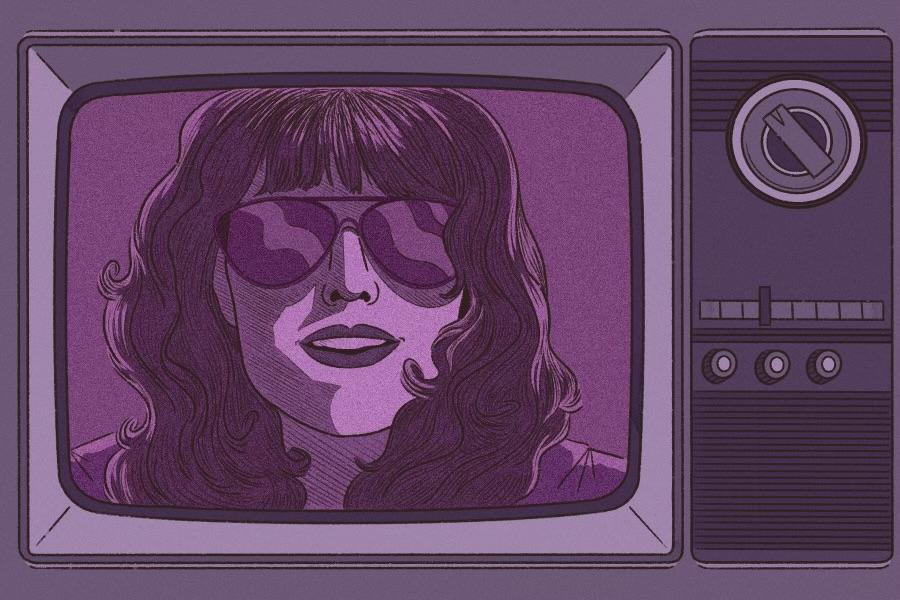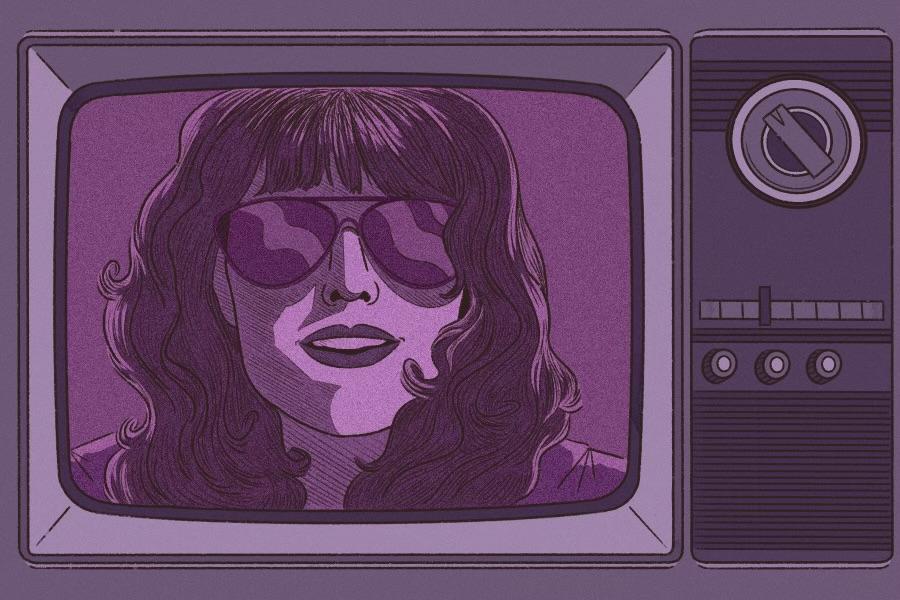
Iconic fictional 70’s rock singer Daisy Jones pictured on a television screen. The book, “Daisy Jones & The Six,” about her rise and fall from fame has recently been adapted to screens, with a few changes. Illustration by Alyson Sutherland.
Content Warning: This article contains spoilers for the franchise “Daisy Jones & The Six.”
For two weeks I would repeatedly see a clip on TikTok of Daisy Jones, played by Riley Keough, singing with an intense, grating voice. Eventually I broke down and decided to pick up the book so I could watch the show when it came out on Amazon Prime. This book is written in the form of an interview transcription about “the renowned 1970’s band, ‘Daisy Jones & The Six,’” and their epic story. Author Taylor Jenkins Reid opens the book this way, speaking from the perspective of the interviewer. Reading this, I was 100 percent convinced that this was a true story about a real band, I mean, when you look them up on any music streaming service, they even have an album! What was I supposed to think? Sadly, this recounting is entirely fictional; “Daisy Jones & The Six,” the iconic joining of two musical geniuses, and their breakup nine years later, is not real.
The face of the book, Margaret “Daisy” Jones, is a young redhead with an equally fiery personality that reflects onto her passionate love of music and use of illicit substances, giving her a magnetic draw that attracts people from all walks of life. Daisy is an independent artist struggling to gain traction in the music industry that wants her sound to be ‘just so.’ Because of her struggles, Teddy Price, a producer known for creating incredible music, gets her in connection with a band from Pittsburgh he’s producing for: “The Six.”
“The Six,” formerly known as “The Dunne Brothers,” only ever had five members at a time: lead singer and frontman Billy Dunne (Sam Claflin), his younger brother and lead guitarist Graham Dunne (Will Harrison), drummer Warren Rhodes (Sebastian Chacon), bassist Pete Loving, and rhythm guitarist Chuck Williams. Early in the book, Loving dies after being drafted for the war, and Williams leaves the band. Loving’s younger brother, Eddie (Josh Whitehouse), is brought on as a replacement for Williams, and the band recruits keyboardist Karen Sirko (Suki Waterhouse), affectionately referred to as “Karen Karen” to complete their sound. The final piece of the band was Billy’s wife Camila (Camila Alvarez), often referred to as the glue of the band by fans of both the book and the TV show.
The beginning of the story has many meaningful differences between the book and the show. In the book, the band that eventually became “The Six” was formed by the Dunne brothers, gradually recruiting members to complete their band. In the show, Graham decides to start a band with his friends and Billy joins later. A key aspect missing from the show was the departure of Loving; in the book he dies overseas but in the show he doesn’t exist at all. Also, we never see Daisy referred to as Margaret in the book, but in the show that is her birth name that she leaves behind when she leaves her parents. The show also disregards the fact that she made an independent album before joining up with “The Six.” Then there is the biggest deviation from the book throughout the whole story: the differences in Daisy Jones herself.
From the first page of the book, Daisy is described as incredibly captivating, and she never pretended to be anyone other than herself in a world full of people trying to look or act a certain way for approval. Daisy was loved because she was magnetic, even without the drugs she lived off of. It is established very early that Daisy is an addict, taking pills and cocaine whenever she has the chance.
The actress that plays Daisy, Riley Keough, who happens to be the granddaughter of Elvis Presley, is incredible, no doubt about it. The character of Daisy Jones is just so huge, it would be near impossible for anyone to fill those shoes, but Keough sure got damn close to capturing the immensity of the character. Her most iconic line in the book encapsulates her entirely: “I had absolutely no interest in being somebody else’s muse. I am not a muse. I am the somebody. End of f***ing story.” Keough’s delivery of this line is perfect, giving just a hint of her insecurity and anger in front of the man that stole her words. Her strength and assurance is what makes her who she is. Daisy was the muse of so many average male rock artists of the fictional seventies, her words garnering them fame and fortune with no recognition for her own talent. In my opinion, the best part about Keough’s performance was how she showed Jones’ love of music, and how her passion comes through her voice. It’s beautiful. The first song Keough sings in the show, “By Myself,” actually made me cry the first time I watched.
This brings me to the part about the adaptation that I’m very conflicted about: the songs. At the end of the book, Reid wrote down the lyrics and titles of the songs from the band’s platinum album “Aurora,” which was named after Camila by Billy. I think the songs in the book are amazing, mainly because I fell in love with how the writing process and the songs themselves were described in the book. And while I couldn’t actually listen to them, as they were written on paper, I had a very specific idea of their sound: somewhat hardcore, gritty and tortured. This is a rock band after all. But, in the show, and the very real album the actors and producers created, almost nothing is the same, from song titles, to the order of the tracks on the album, to the lyrics. The title track “Aurora” was very intentionally the last song on the album in the book, but in the show, it is the first song on the album. One of the few songs that remained on the real album, “Please,” was written by Billy about his and Daisy’s affair in the show. In comparison, the book version of the song was written by Daisy about unspoken desires and things better left unsaid, clearly referring to Billy. In the show, it is entirely about Billy’s physical desire for Jones and his begging for forgiveness from Camila because of it.
This comparison is a perfect example of the key differences in the book and show of Daisy and Billy’s relationship. In the book, he doesn’t physically cheat on Camila with Daisy, the two of them just have a deep-seated desire they share and an almost-kiss he walks away from. Hell, he even says in the book, “History is what you did, not what you almost did, not what you thought about doing. And I was proud of what I did.” And I was too; the show taking that away and erasing the special bond they shared really pissed me off. The show has Billy cheat on Camila with Daisy more than once, even going so far as to tell her they can be together because Camila is leaving, which she is not. Ayn Frazee, Franklin High School librarian, said a likely reason for this change was because “There’s this drive to punch up the drama for adaptations” but that she still finds it “totally unnecessary to make Billy Dunne a cheater [..] they had plenty of interpersonal drama without that.”
Though I do have issues with the show, one thing I am glad they added is the deep dive into the story of Daisy’s best friend and disco star, Simone Jackson (Nabiyah Be). In the book, we get very little information about what Simone is doing while working on her music career in New York, but in the show we get to follow her and her girlfriend Bernie (Ayesha Harris) as they figure out what kind of life they can and want to live together in the big city. The look into what queer life was like 50 years ago was something that made me as a queer fan so happy. Simone and Bernie’s story was the best way the show could have deviated from Simone’s character in the book, and they killed it.
Frazee said the general theme of the book was that “Sometimes you need to lose yourself to find yourself. [Daisy] was a person who really tied her identity to other people,” and Daisy went through so much suffering and came out of it her own person; that was when she began to really flourish.
Despite my problems with the adaptation, I will readily admit it was amazing, in part because of the differences. While I discussed a great many things about this book, there is so much more that will continue to draw fans into the epic story of “Daisy Jones & The Six.”

































